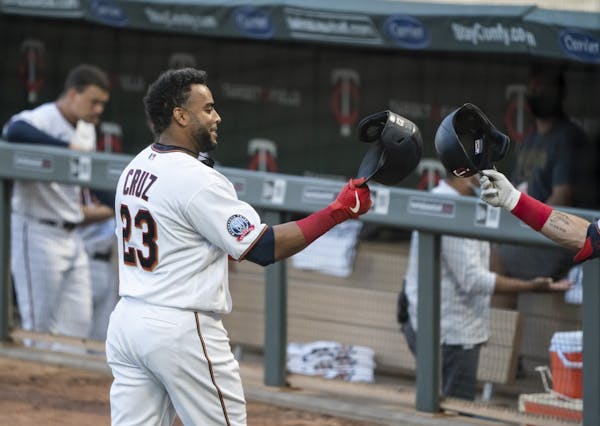Doug Mientkiewicz departed the Twins as a player in a four-team trade on July 31, 2004, and he returned to the organization as manager of the Class A Fort Myers Miracle for 2013.
The roster included first baseman Kennys Vargas, second baseman Eddie Rosario and third baseman Miguel Sano. They would take pregame batting practice together and it was can't-miss entertainment for the rookie manager.
"They would compete in BP, and get on one another with enthusiasm," Mientkiewicz said. "For a while, Miguel's favorite way to agitate Rosario was to say, 'Hey, Eddie, A.J. Pettersen sends his best to you from Double-A.'
"Miguel and Vargas would roar with laughter, and Eddie, steamed, would swing out of his shoes trying to hit a 450-foot home run."
Pettersen was an infielder from Minnetonka and was drafted in the 25th round in 2011 as he concluded an excellent three-year career with the Gophers. Rosario was the fourth-round choice in 2010, and had done well as a 21-year-old member of Puerto Rico's runner-up team in the 2013 World Baseball Classic.
Yet, when minor league camp concluded in 2013, Pettersen was the infielder sent to Class AA New Britain and Rosario remained at high-A in Fort Myers with Mientkiewicz.
"I'm not surprised that Miguel would use that to get on Eddie," Pettersen said this week. "I was with those guys for three years. I speak Spanish, and that helped make us close as teammates."
Pettersen permitted himself a laugh and said: "I had no delusions that being promoted to Double-A put me ahead of Eddie in the organization. The Twins wanted a utility player in New Britain and that was me.
"Eddie had to play every day. There was never a doubt that with those amazing hands, he was going to be a big-league hitter."
Pettersen was not hitting at Class AA in 2014, was demoted back to Fort Myers, quit and came back to Minnesota. He coached baseball at Chanhassen High for four years. He's now full-bore as a real estate agent and raising two boys with his wife, Emily.
Any Rosario stories, though … A.J.'s on board. "It has to be great to play the game with that much confidence," Pettersen said of Eddie.
Rosario made it to the Twins on May 6, 2015, homered in his first at-bat, and batted .267 with 13 home runs over 122 games. He had made the transition from second base to the outfield in 2014, and he looked to be set out there with the Twins for years to come.
That happened, but with a delay, after he batted .200 for two months starting 2016 and was sent to Class AAA Rochester for a tuneup.
"What's wrong with Eddie?" everyone asked.
Not everyone, actually. Not Eddie.
"Eddie had a swagger that was second to none," Mientkiewicz said. "He knew something a lot of players in Class A don't know. He knew he was going to the big leagues and would hit when he got there."
Eddie came back to the Twins from Rochester on July 3, 2016, and batted .305 over the remainder of that lost season (59-103). Starting then, he has joined Max Kepler in giving the Twins corner outfielders to be envied by most every team in the big leagues.
Rosario was about to get paid handsomely — $7.75 million for 2020 — but then came the virus and a 60-game schedule. He'll have to wait to fully collect on that gift for smacking a baseball, be it high, low or bouncing; in, out or in the righthanded batter's box.
Mike Radcliff has been evaluating players for the Twins since 1987 and he has been a vice president for player personnel since 2007, both for the Terry Ryan/Bill Smith operation, and now for Derek Falvey.
He's in a grueling battle with cancer right now, but international players have been a major part of his focus, and he's ever-willing to talk about Rosario. The Twins lucked out to some degree in the 2010 draft, because they had two infielders from Puerto Rico — Rosario and Henry Ramos — rated about the same.
Nine years later, Rosario has 640 games in the big leagues, and Ramos (a fifth-rounder to Boston) has none.
"It was a close call, but Tim O'Neill was scouting for us and he said, 'Rosario's swing is different; it's going to be a big-league swing,' and that convinced us," Radcliff said. "Eddie comes from a tough town, Guayama, sort of a dangerous place, and that might have scared off some teams … I don't know.
"He was a skinny infielder, but when he put hands on a bat, it was sort of magic. Eddie was one of those guys you grew up with in every town. He could do anything. Play him in pool, Ping-Pong, tennis, badminton … name it, he was going to beat you."
The Twins were not distracted by the fact the 18-year-old Rosario would swing at every pitch he could reach, and many that he couldn't.
Radcliff laughed and said: "Puerto Rico … those kids love to rake. [Jose] Berrios is something of an exception, because you don't often find pitchers in Puerto Rico. The kids there want to hit.
"When you scout Puerto Rico, you're going to see catchers, and hitters."
Rosario hit 32 home runs, drove in 109 runs and scored 91 last season, and he did so by drawing 22 walks.
Twenty-two.
"Bello!" (Beautiful!) say the young ballplayers in his homeland who love to swing the bat. "Raise that on-base percentage," says Edgar Varela, the new hitting coach, as did James Rowson before him, and Tom Brunansky before him, and every minor league instructor Eddie had on the way to the Twins.
"Not me; not often, anyway … maybe if he swung at a couple pitches in a row that were over his head," said Mientkiewicz, now out of managing or coaching. "I didn't try to rein in Eddie's aggressiveness.
"I was one of those players who always was worried about making a mistake. I made my mistakes by staying put. Eddie was out there trying to hit a double in the gap, not get a walk; he was trying to get another 90 feet and score a run. Those are better mistakes to make."
Rosario was answering questions in a Zoom interview last week and the familiar question about drawing more walks was asked — about the need to raise the on-base percentage and thus the sacred on-base plus slugging percentage (OPS) of modern baseball.
"I listen to the plan that Varela gives me," Rosario said. "I'm open-minded. We're working on bringing up my OPS. That's one of the goals this season … to be more selective."
Although: "The main thing for me is, besides having my own plan, I take their advice to get better."
There was an indication in Monday's final intrasquad game at Target Field that "having my own plan" remains the odds-on favorite as Rosario enters this short season.
Rosario was watching as Kenta Maeda struck out Josh Donaldson on a couple of off-speed pitches in the first inning. When Rosario faced Maeda, the first pitch was off-speed. Eddie looked as if he was out front, but the hands stayed back and he ambushed a ball that was a half-foot above the plate and sent a fly ball to right that landed in the foliage above the wall for a home run.
Magic hands. Don't mess with Eddie. Let him swing — and if not for him, for all the young rakers on his island.
![Minnesota Twins outfielder Eddie Rosario. ] CARLOS GONZALEZ • cgonzalez@startribune.com – Fort Myers, FL – February 20, 2020, CenturyLink Sports](https://arc.stimg.co/startribunemedia/BY7YSADX6ASA2KDV7V36SEKPWY.jpg?fit=crop&crop=faces&w=550&&auto=format)









